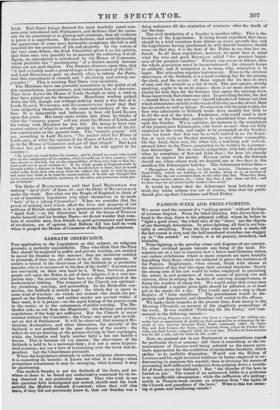SABBATH OBSERVANCE.
THE application to the Legislature on this subject, on religious grounds, is perfectly unjustifiable. They who think that the First Day should be assigned to public and private worship, are entitled to spend the Sunday in this manner: they are moreover entitled to persuade, if they can, all others to be of the same opinion. If society is bound to the observance of the Sabbath in a particular manner, why is it not proved in the face of the world ? if persons are not convinced, on their own head be it. When, however, pious people call upon the Police in aid of their religion, it is a very sus- picious step : the secular arm has been too often employed at the ecclesiastical bidding. The weapons of the Church are spiritual : try preaching, praying, and persuading. In the Methodist con- nexion, the Sabbath is strictly kept : the whole day is spent in some kind of worship: no viands are cooked—the meals are pre- pared on the Saturday, and neither master nor servant works: if they meet, it is in prayer—on the equal footing of the prayer-room in the vestry, or in the communion of public worship. The Me- thodist asks no aid from the Magistrate : the feelings and private regulations of the body are sufficient. But the Church is never content without the Constable; the Clergy can never get on with- out an Act of Parliament. It will be observed, that amongst Me- thodists, Anabaptists, and other Dissenters, the sanctity of the Sabbath is not confined to the poor classes of the society : the elders do not go feasting, or the parsons driving in their equipages, while the humble and lowly neither light a fire nor handle a broom. This is because all ore sincere: the observance of the Sabbath is held to be a universal duty ; it is not a mere hypocri- tical pretence, nor yet a love of tyrannizing over the weak and de- pendant. Let the Churchman persuade. - When the Legislature attempts to enforce religious observances, it is exceeding its bounds: it knows not what it is doing—what scrupulous consciences it may be outraging, what tyranny it may be sanctioning. The modern Sunday is not the Sabbath of the Jews, and no- where is there to be found any authoritative command for its be- mg observed in any particular manner. They who wish to see this question fully investigated and settled, should read the book entitled the Modern Sabbath Examined; when they will also learn, if they did not previously know it, that our Sunday was a thing unknown till the expiration of centuries after the death of our Saviour.
The civil institution of a Sunday is another affair. This is the business of the Legislature. It being found expedient that there should be a total cessation from labour on every seventh day, and the Legislature having proclaimed its will that all business should cease on that day, it is the duty of the Police to see that law en- forced. In all these regulations, however, we must bear in mind what the wise and good BENTHAM called "the greatest happi- ness of the greatest number."' If every one ceases to labour, then the whole population must be inconvenienced: the stomach keeps no sabbath; and if occupation is to cease, why, relaxation is to begin. But relaxation requires instruments. Even in the strictest observance of the Sabbath, it is a hard-working day for the parson, the clerk, and the sexton: all those regard the six days as days of rest, and the seventh as a day of work. The pew-opener, strictly speaking, ought to be on his knees: there is no more absolute ne- cessity for him than for the footman that opens the carriage-door. Some must work that others may play. In providing for this, the Act —should there be any new one—should interdict all labour but that which administers strictly to the wants of the day as a day of rest. Rest has its wants as well as labour. No objection will be made to this, for they who administer to Sabbath wants have usually but little to do all the rest of the week. Tradesmen, who could send in their supplies on the Saturday, ought to be interdicted from trenching upon the Sunday. We sympathize, for instance in the complaints of the journeymen fishmongers, who know no rest: they are fully employed in the week, and ought to be exempted on the Sunday, since we know that fish may be as well carried in on the Satur- day, or very early on Sunday morning, as any other commodity. On this head, there was, the other day, a touching and well-ex- pressed letter in the Times, purporting to be written by a journey- man fishmonger. But we cannot sympathize with him altogether when he complains of fast and feast days ; for here his remedy should be against his master. Having extra work, the fishmen should say, when others work, we demand one or two days in the month as the fishmongers' holyday. The fishmonger writes thus- " Throughout the whole year, we have no holyday. Christmas-day and Good Friday, which are holydays to all besides, bring to us an increase of labour. One day our customers feast, on the other they fast. When they feast, I take them turbot, salmon, Ste. : when they fast, I take them salt fish ; and on these days we are much harder worked than usual."
It would be better that the fishmonger kept holyday every tenth day while salmon was out of season, than that the public should give up their Christmas and Good Friday.




















 Previous page
Previous page